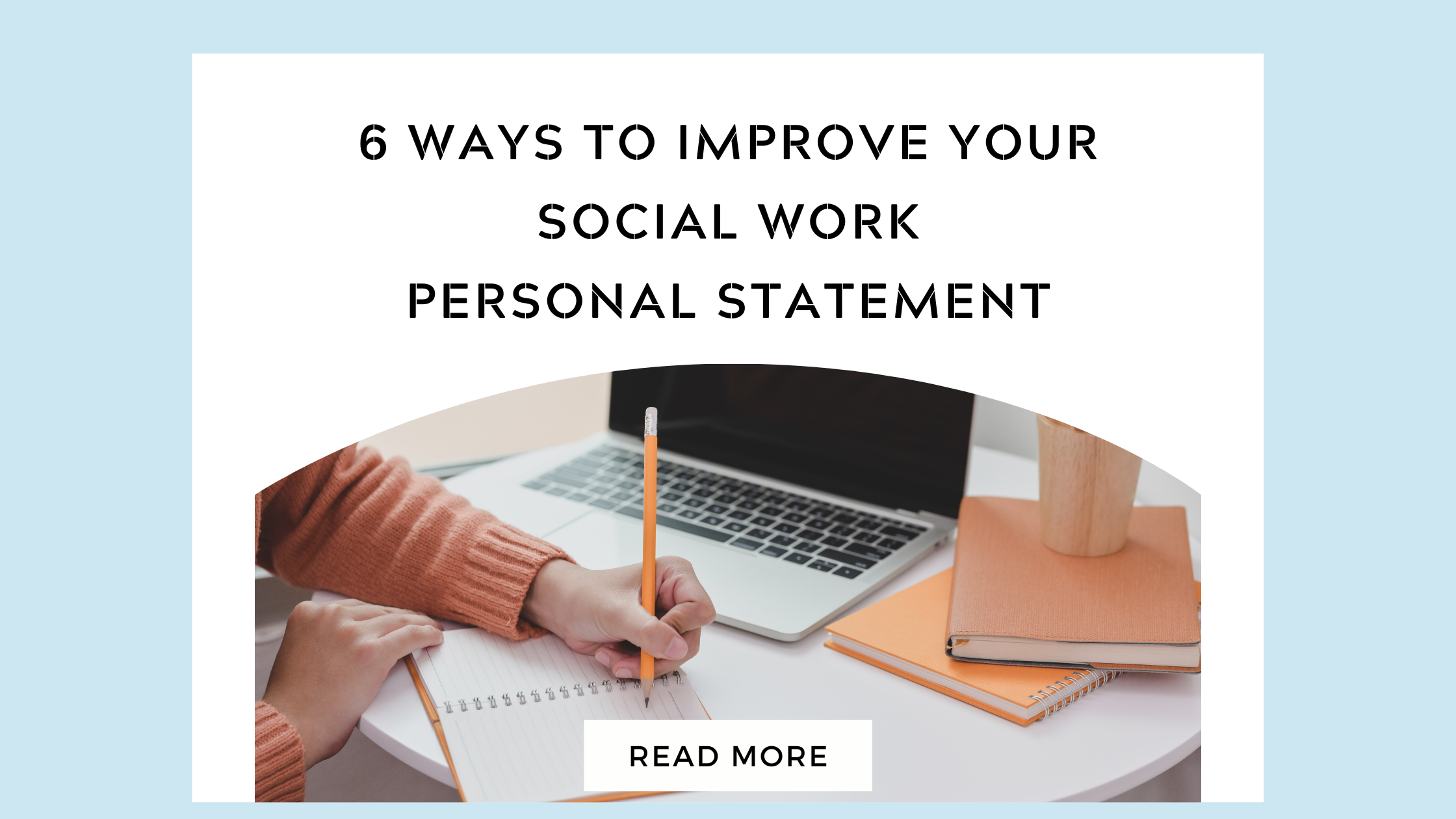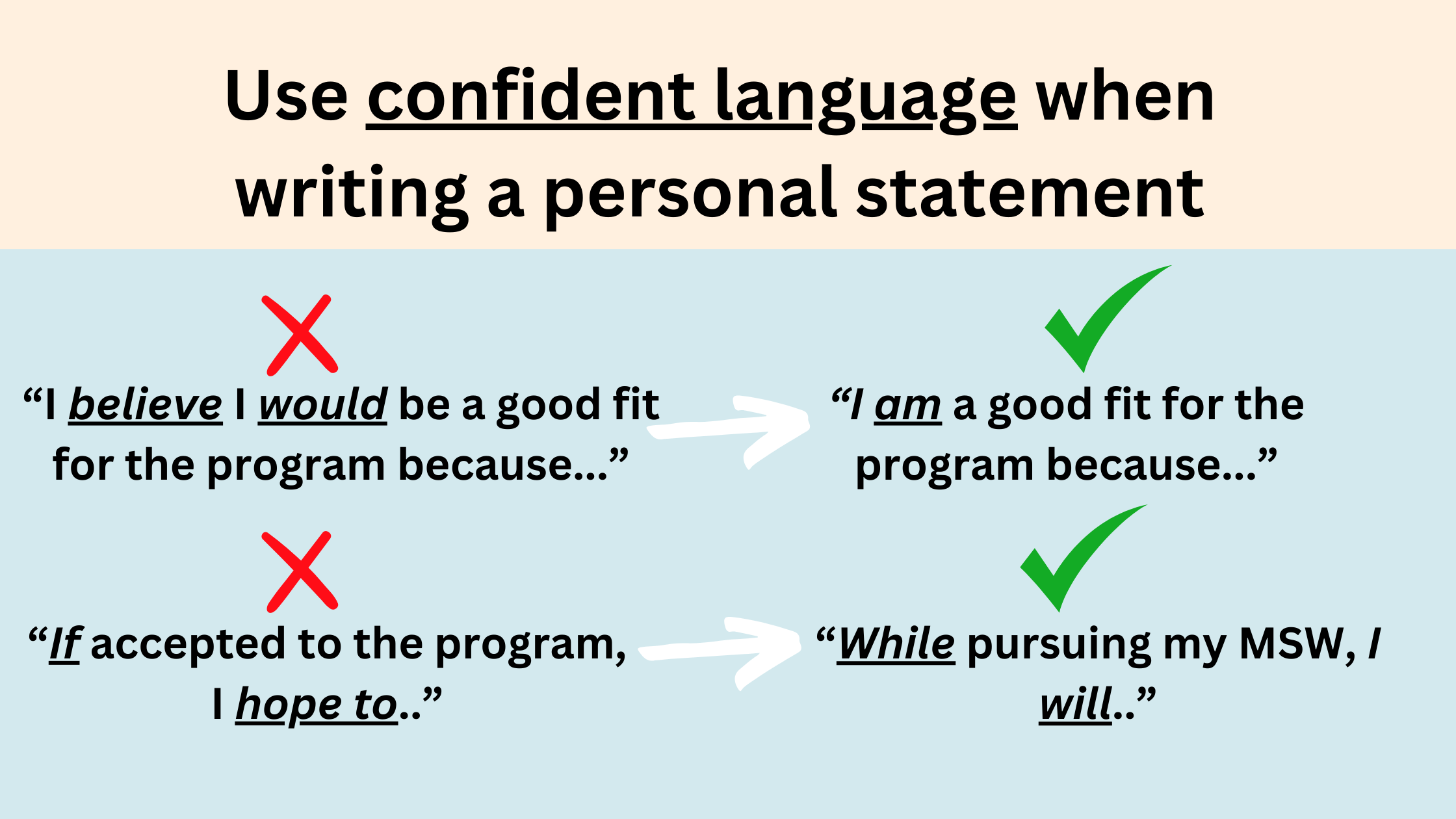Six personal statement tips that actually work (from a professional editor)
As an Application Advisor at MSW Helper, I have edited many personal statements. Each statement I edit is unique because each applicant has different skills, experiences, and interests within the field. However, while editing personal statements, I have noticed that I often make several key edits on many statements. I also made many of these mistakes on my personal statement when I applied to my MSW as well! I have compiled a list of tips to improve your personal statement based on these key areas for improvement.
I recommend the following:
Use formal language: Your personal statement should be written in a professional, academic tone since this is a a piece of writing that will demonstrate your academic writing skills.
Be confident: Convey to the admissions committee that you have confidence in your ability to excel in the field.
Check your spelling: Especially things like the name of the school or program you are applying to.
Utilize evidence: Social work is an evidence-based field, so using research to back up your points shows alignment with the profession and proves that there is a need for social work in your area of interest.
Follow APA format: This is a simple modification that can add a lot of professionalism to your personal statement.
Make each statement unique: Using the same statement for each school to save time can be tempting, but this should be avoided to prevent your applications from appearing incomplete.
Now, let’s talk about how to implement all of these tips!
Use Formal Language
Formal, academic language is essential when completing assignments in graduate school, so this writing style should be used in the personal statement. This can be difficult because you are writing about yourself, but many of the assignments in an MSW include some form of personal commentary yet still require formal language. Two key issues related to formal language are contractions and colloquialisms.
Contractions are words like “isn’t,” “wasn’t,” and “won’t” and should not be included in formal writing. However, they are terms we use daily, so it can be hard to notice or avoid them when writing. When an applicant submits a personal statement to MSW Helper, this is one of the first things I edit because once you train your brain to notice it, it’s easier to avoid.
Colloquialisms are familiar phrases we may use in daily language, but they should be avoided in formal writing. For example, “I wanted to dip my toes into social work.” The message here is fine, but it is how it is said that needs to be adjusted for an academic piece of writing. A formal way of saying this would be, “I wanted to gain more experience in social work,” which conveys a similar message but is more academic.
Be Confident
Your personal statement is an opportunity to show the admissions committee who you are and why you are an ideal candidate for the MSW program. One way you can convey this is through strong, confident language.
For example, I often see applicants stating, “I believe I am a good candidate,” or beginning sentences with “I believe” in general.
I, too, wrote many of my sentences like this. However, a social work professor commented on it during my first semester of the MSW program and said that using the phrase “I believe” weakens your writing. If you believe something, then write like it is true.
Instead of saying, “I believe I am a good candidate,” just say, “I am a good candidate,” and show the committee that you are confident about your candidacy. The same goes for discussing your social issue. Instead of saying, “I believe children’s mental health must be more adequately addressed,” you can strengthen your sentence by saying, “Children’s mental health must be more adequately addressed.”
Another example of language that weakens your statement is “I would” or “If I” when referencing admission to the program or a future career in social work. Instead of saying, “I would be a good candidate” or “If I am accepted,” write as if you will be accepted and you are a good candidate.
Check Your Spelling
Spelling, in general, is a big deal in writing. While all spelling is important, the correct spelling of the school and any faculty members you mention in your statement is key. If you are applying to an MSW program and reference the name of the school in the statement several times, yet spell it incorrectly, this can negatively impact your statement.
A great example of this is Laurier in Ontario. The correct name of the school is Wilfrid Laurier University, but it is often misspelled as Wilfred, as this is a more common spelling. When discussing professors you are interested in working with, double-check the program website to get the correct spelling of their names, as you never know who a part of the admissions committee may be. Doing these things will show the school that you pay attention to detail.
RELATED: Most common grammar errors in the MSW personal statement
Use Evidence to Strengthen Your Statement
Citing the literature can be a great way to show your understanding of a social issue of interest, but it is important to use evidence correctly.
When providing an overview of a social issue, it is valuable to include research. However, you must then analyze the research you reference. If you only have research with little analysis, the admissions committee will not see your understanding of the topic or your unique take on the issue. Your evidence should complement your statement, not form the bulk of it. Further, ensure your citations are not all direct quotes. Direct quotes are fine, but some citations should be paraphrased to show your understanding of the information.
If you begin a sentence with “evidence shows,” include a citation to show what evidence you are referring to. If you are backing up your claim with evidence, you must show where that evidence is coming from to prove that what you are saying is credible. You can include an in-text citation at the end of the sentence or replace “evidence shows” with the name of the evidence you are referencing.
APA Format Personal Statement tips: Follow APA 7 Guidelines
APA 7 is the formatting most social work programs use, so using APA format for your personal statement will show that you understand this style, and will make your application stand out. APA 7 formatting has guidelines about setting up your document, headings, in-text citations, the reference page, and more. Information about the guidelines can be found online, but here are a few key tips based on errors I commonly see:
Your reference page title should be “References” and bold and center-aligned.
Only the first word and the first word after a colon should be capitalized when referencing an article. The rest should be lowercase.
In-text citations should reference the author's name, not the article's or book's name.
If you use an online citation generator, double-check the citation and cross-reference it with APA 7 guidelines to ensure it is correct.
Remember, APA 7 is a new formatting version, and there are differences from APA 6!
While the admissions committee likely will not be verifying your correct use of the formatting, and a small error may not make or break your statement, writing your personal statement in APA format is a good way to show the school that you are prepared for study at the academic level, as you will be using APA 7 during the program.
Read more: How to format your personal statement in APA format
Make Each Personal Statement Unique
Let’s face it, statements take a lot of time to write, especially when applying to multiple schools. Using the same statement for each school to save time can be tempting, but this should be avoided. I’m not saying you must start from scratch and write something completely different for each school. Your experience, interests, and goals will not change, which would be impossible! While much of the information will likely be the same, each statement should be tailored to the school you are applying to. The admissions committee wants to see that you understand their program and have done the necessary research before applying. You can do this by mentioning specific faculty you would like to work with, courses you are interested in, or unique opportunities the school offers and relating these to your interests and goals. If you are working with a small word limit, this may be difficult, but even mentioning one unique aspect of the school can make you stand out.
RELATED RESOURCE: MSW Application Guide
As I said, these are errors that are easy to make, many of which I made myself while writing my personal statement. What truly matters is how well you convey yourself, your experiences, and your goals, but improving these six areas can help strengthen your statement!
Ps. Remember how I mentioned I edit personal statements professionally? MSW Helper is the only personal statement editing service that specifically supports those who are applying to MSW programs. MSW Helper was created by social workers, for future social workers!




